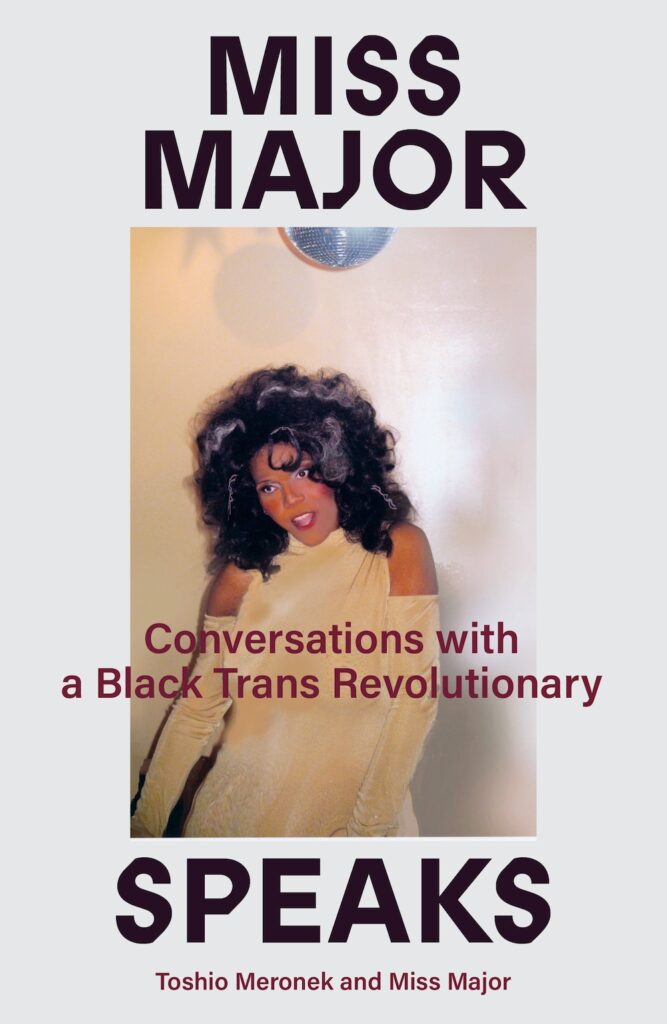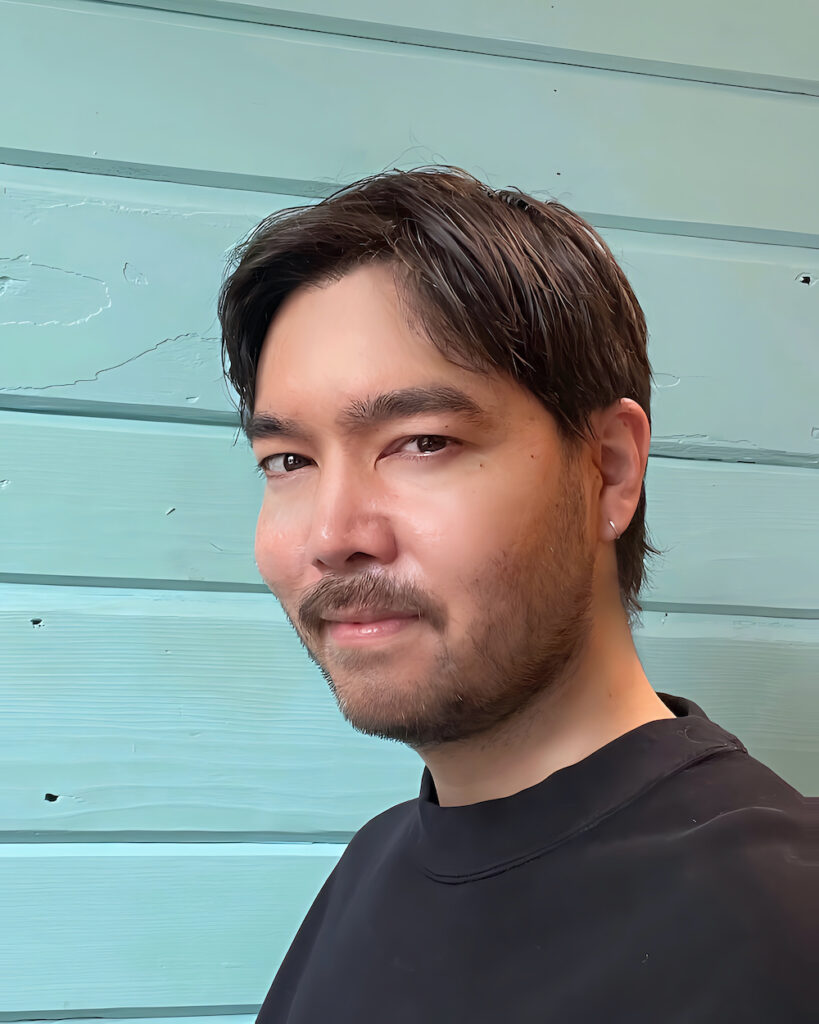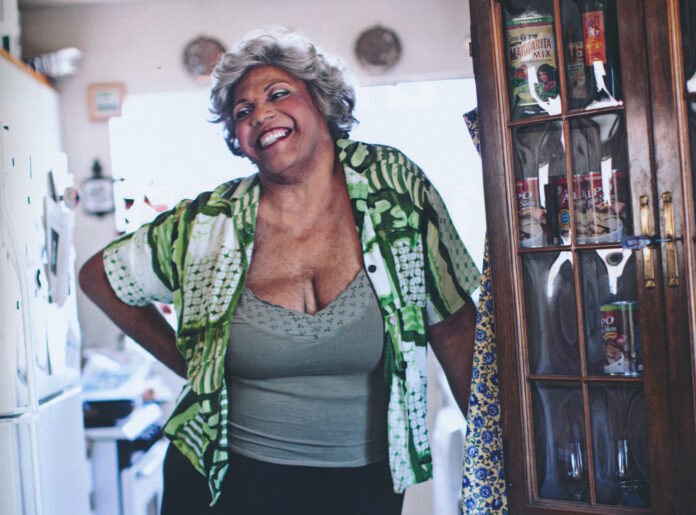Sure, she was at Stonewall. But that’s hardly the only achievement that harm reductionist and trans rights advocate Miss Major Griffin-Gracy has under her belt. The 82-year-old community organizer drove San Francisco’s first needle exchange van back in the day. In her time at the Tenderloin AIDS Resource Center, Major founded a 24-hour drop-in center named GiGi’s PLace that she stocked with comfy couches and mirrors so that her gurls (preferred nomenclature for her trans sisters) could do their face before heading out for a shift of sex work.
Which is to say that Major’s been working on the answers for many of the city and country’s most persistent issues—drug user and trans woman safety, for example!—much longer than many of the people reading this have been alive.
Major’s assistant, journalist Toshio Meronek, became quite sure that the lessons learned by Miss Major during her decades of activism would be of importance to the generations who are to come. Meronek and Major hit upon a plan not to get her life story down on paper—Major wasn’t interested in a standard biography—but instead record their conversations about her experiences, and the techniques she uses to best serve her communities.
The result, Miss Major Speaks: Conversations With a Black Trans Revolutionary ($16.96, Verso) is an astonishing and deeply inspirational read. With chapter titles like “Do What You Have To Do To See The Next Day,” the book offers practical survival techniques delivered in Major’s never-preachy, often-riotous voice. Its cynicism for the power of mere representation, coupled with the trans leader’s resolutely irreverent tone, seems especially important during an era in which social justice for marginalized communities seems at once closer and further away than ever before.
Major and Meronek are bringing the nationwide celebration of their luminous project to the Bay Area for a Tue/30 presentation at San Francisco’s Main Library. In advance of this homecoming, they graced us with an email interview that touches on the city’s strengths and failures, journalistic inspiration, and the trait all good organizers share.

MISS MAJOR
48HILLS The city is overjoyed to have you speaking at the San Francisco Public Library on May 30. You have such a storied relationship with San Francisco, I’m wondering: What do you love about this place? What can’t you stand about it?
MISS MAJOR GRIFFIN-GRACY What I love about San Francisco? What’s not to love? That place is just phenomenal, not one other city can lean on the look of SF, the feel of it … That’s the one place where everybody is supposed to be able to live a life that’s fair. It’s not true—but you think it is when you go there. That it’s not true … that’s the only sad thing about it.
48HILLS We learn so much about Toshio’s reasons for wanting to work with you in Miss Major Speaks. I’d love to know more about your side of this story—what convinced you that they would make a good ally?
Help us save local journalism!
Every tax-deductible donation helps us grow to cover the issues that mean the most to our community. Become a 48 Hills Hero and support the only daily progressive news source in the Bay Area.
MISS MAJOR GRIFFIN-GRACY He’s been around 10 years, and he’d been listening in on me for years anyway. He’s a good listener and I figured I wouldn’t have to worry about him printing anything that was untrue, or anything that didn’t need to be out there. Some secrets … they’re called “secrets” for a reason.
48HILLS Speaking of ideals, what would you say are the key traits of an effective organizer?
MISS MAJOR GRIFFIN-GRACY The best trait an organizer can have is to listen, and to listen closely to what the people want. If you go someplace cold and say, “I have a whole bunch of socks,” and somebody says, “I don’t need socks, but give me a sweater, let me borrow a blanket,” listen to them closely, and find out what it is they need. Because a lot of people think they know what’s best without ever spending a minute listening to what the people need. It’s so wrong.

TOSHIO MERONEK
48HILLS Were there any previously written books or other projects that served as inspiration when you guys embarked on the creation of Miss Major Speaks?
TOSHIO MERONEK I met Major through Eric Stanley, who co-edited the book Captive Genders, one of the first books about queer and trans people and prisons. Major’s got an interview in it. Her way of speaking and communicating is probably the thing that attracts people to her the most, and the interviewer Jay Donahue captured that in writing. Eric’s new book Atmospheres of Violence is the most beautiful writing about some really crushing subject matter—violence against trans people. Three people in Major’s life who are writers read the manuscript and gifted us quotes for the back of the book—Angela Davis’s autobiography and books of speeches, Janet Mock’s memoirs, and Tourmaline’s films were all inspiration as well.
48HILLS Did you consider yourself a mere vessel for her voice in the context of co-creating this book? Or were there times when you found yourself pushing the dialogue in a unique direction?
TOSHIO MERONEK In the book, my role is to stand in for younger activists who come to Major to learn from her wisdom. I interviewed 20 people who considered Major to be a mentor, while Major wasn’t in the room or on the line. And then as I was transcribing my conversations with her I pulled out things that were useful to me, and things that it seemed the people I’d interviewed would have found useful. She let me decide what ended up in the book, and I tried my best. Someone else could probably make another book out of the transcripts we didn’t use.
Major wasn’t interested in doing a biography, but she was OK with having her stories published if it might be useful to her gurls—her community. Which is the same way she and the director and producer, Annalise Ophelian and StormMiguel Flores, went into making the documentary about her life.
Having relationships with people who have been doing movement work for many more years than me has been huge in my own life. It’s helped with the depression and anxiety that come out of fighting these forces – Major calls them “The Powers That Be” – that often seem like they’re immune to whatever we try to throw at them. The longer perspectives that Major has, or the perspectives of friends like Deeg and Tory, who organize in SF with Gay Shame and Queers Undermining Israeli Terrorism, keep me from burning out.
48HILLS Was there anything that didn’t make it into the book that pained you to leave out?
TOSHIO MERONEK Major’s always playing the Transcendence Gospel Choir in her car—it’s the first all-trans gospel choir, which started in the Tenderloin. Major was one of its members, with her close friend Bobbie Jean Baker. There’s a really sweet movie about it called The Believers that tells the story really well.
48HILLS What is the most common misconception about Miss Major’s life work that you would like to lay to rest?
TOSHIO MERONEK Lots of people call up Major asking her to re-narrate the Stonewall riots, because she’s probably the most well-known rioter who’s still here with us. Driving one of the first needle exchange vans in the Tenderloin with her friend Guy Vandenberg, or nursing gay guys with HIV/AIDS in New York in the 1980s when the disease was still called GRID—those moments hold just as much revolutionary potential as the symbol of Stonewall. Or: at some point the internet started running with the idea that Major was at Attica prison during the Attica riots. She wasn’t—though her mentor Frank “Big Black” Smith was. They met inside Dannemora prison when he was transferred there after the riot.
MISS MAJOR IN CONVERSATION WITH TOSHIO MERONEK Tue/30, 6pm, free. San Francisco Main Library. More info here.






